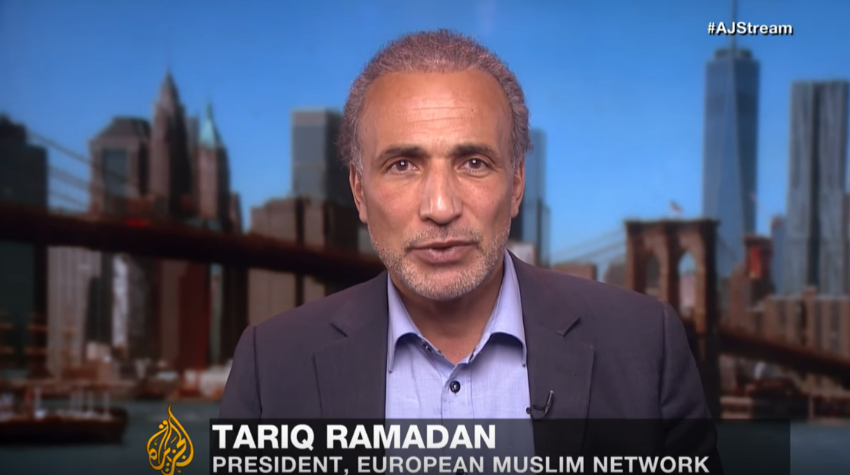Indian MuslimsBy TwoCircles.net staff reporter,New Delhi: Eminent theologian and writer Tariq Ramadan delivered a lecture on ‘Christianity and Islam: Values and History’ on 3rd July at Jamia Millia Islamia (JMI). The programme was organized under JMI’s Outreach programme.
Prof Ramadan’s talk focused on the similarities and differences between the two great religions of the world and the need to rise above differences and look at ways to live with harmony and trust. He stressed the need for honest self-appraisal, critical thinking and a commitment to the principles of one’s own religion while also showing respect for other traditions, beliefs and practices.
A Swiss Muslim, academic and theologian, Ramadan spoke passionately for the need to re-visit and re-appraise old, contentious issues. He advocated the studying and re-interpretation of Islamic texts, and emphasized the heterogeneous and diverse nature of Islamic society. He stressed that Muslims in Europe have to establish a new “European Islam” and emphasized the necessity for their engagement in European society.
A measure of his popularity was found in the lively Q&A session that followed his talk and the group of, mostly young, admirers, who besieged him at the tea that followed. Widely read in India, Ramadan is the author of 15 books on Islam, most readable among them if the biography of the Prophet, In the Footsteps of the Prophet: Lessons from the Life of Muhammad. His other books include Western Muslims and the future of Islam and To Be a European Muslim., Islam, the West, and the Challenge of Modernity.
Ramadan has taught Religion and Philosophy at the University of Fribourg and the College de Saussure, Geneva and later at St Anthony’s College, Oxford. In September 2005 he was invited to join a task force by the Government of UK. He is also guest professor of Identity and Citizenship at Erasmus University, Rotterdam and an advisor to the EU on religious issues.
He was introduced to the audience by JMI vice-chancellor Prof. Mushirul Hasan.
Addressing the audience, Ramadan said he had been among Christians for a number of years in order to comprehend this topical theme and traversed the space from experience to the text (Qur’an) and, then, it dawned upon him what he was going to convey.
Ramadan said we should admit that we can commit mistakes in understanding the text, whether from Qur’an or from Bible, and that whatever the Jews and Christians opine about us that ideology is based on their reading of Torah and Bible. He said usually we compare our ideals with others’ reality which is not correct, though we can compare our text with others’ text, our values with others’ values and our situation with others’ situation. He advised that we should study history because it makes a man humble and deepens the understanding of a mind. Knowing history we can understand the text properly, saying that all religions may be great or may not be so.
Ramadan said dialogue requires understanding other peoples’ psyche because we cannot understand other people without understanding it. Referring to truce of Hudaibiyyah, he said the Prophet of Islam (S.A.W.) was adept in understanding peoples’ psyche and their nature. He said we need to admit the mental trauma caused to others and ourselves as well as the excesses committed in past so that the dialogue may proceed. Citing the period of Ottoman Empire as an example, he said we should admit that the non-Muslim were required in that period to wear a particular type of dress and that excesses were committed against Ahl-e-Zimmah (non-Muslims living in a Muslim country).
He said three things are essential for a dialogue: intellectual empathy, deep faith and rationality and spirituality. He said it may be incorrect to ask any person to observe veil, it is equally wrong for a state to force anyone to not observe veil. He said the first thing required for coming out of the present situation is humility, education, self-knowledge and patient ears for others. Second point is dialogue that requires removing non-confidence from the mind of the other partner of dialogue. Third point is recognizing that all points are important and the fourth one is attachment of scholars participating in the dialogue with their own community. He said the last condition is working together and this requires respecting others’ nature and dignity as well as sense of justice.
SOURCE : Indian Muslims



![PALEXPO : Democratic Engagement & Justice for Palestinians [08/07/2017]](https://tariqramadan.com/english/wp-content/uploads/sites/9/2017/07/Palexpo.png)
![Bristol Festival of Ideas : Conversation with Julian Baggini [24/05/2017]](https://tariqramadan.com/english/wp-content/uploads/sites/9/2017/06/bristol.png)
![Interview on BBC Radio Ulster [06/06/2017]](https://tariqramadan.com/english/wp-content/uploads/sites/9/2017/06/p03nnqlv.jpg)
![Interview on BBC 4 : What do the London attacks have to do with Islam? What is the Muslims’ responsibility?[06/06/2017]](https://tariqramadan.com/english/wp-content/uploads/sites/9/2017/06/bbc.jpg)


salam très bonne article merci !!
http://www.danishmuhammedcartoons.com/Apology.html